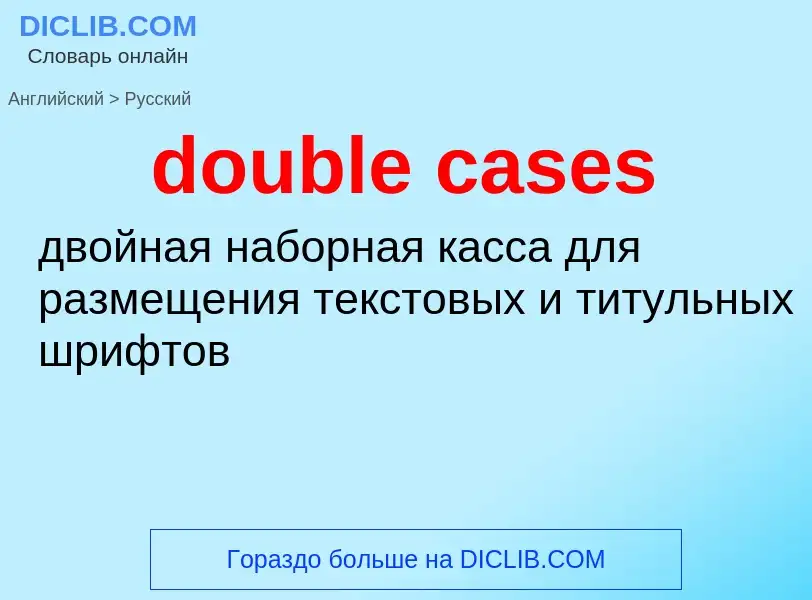Перевод и анализ слов искусственным интеллектом ChatGPT
На этой странице Вы можете получить подробный анализ слова или словосочетания, произведенный с помощью лучшей на сегодняшний день технологии искусственного интеллекта:
- как употребляется слово
- частота употребления
- используется оно чаще в устной или письменной речи
- варианты перевода слова
- примеры употребления (несколько фраз с переводом)
- этимология
double cases - перевод на русский
общая лексика
двойное действие
['du:blɑ:ŋ'tɑ:ŋdr]
общая лексика
двойной смысл
двусмысленность
двусмысленное слово или выражение
существительное
Франция
двусмысленное выражение, двусмысленность
существительное
общая лексика
двоякое значение
двусмысленность
[dʌbl'ækʃ(ə)n]
прилагательное
военное дело
самовзводный
синоним
существительное
['dʌblækʃ(ə)n]
музыка
механика с двойной репетицией
Определение
Википедия
The Slaughter-House Cases, 83 U.S. (16 Wall.) 36 (1873), was a landmark U.S. Supreme Court decision consolidating several cases that held that the Privileges or Immunities Clause of the Fourteenth Amendment to the U.S. Constitution only protects the legal rights that are associated with federal U.S. citizenship, not those that pertain to state citizenship. Though the decision in the Slaughter-House Cases minimized the impact of the Privileges or Immunities Clause on state law, the Supreme Court would later incorporate the Bill of Rights to strike down state laws on the basis of other clauses. In 2010 the Court rejected argument in McDonald v. Chicago to overrule the established precedent of Slaughterhouse and decided instead to incorporate the Second Amendment via the Due Process Clause of the Fourteenth Amendment.
Seeking to improve sanitary conditions, the Louisiana legislature and the city of New Orleans had established a corporation charged with regulating the slaughterhouse industry. Members of the Butchers' Benevolent Association challenged the constitutionality of the corporation, claiming that it violated the Fourteenth Amendment. That amendment had been ratified in the aftermath of the American Civil War with the primary intention of protecting civil rights of millions of newly emancipated freedmen in the Southern United States, but the butchers argued that the amendment protected their right to "sustain their lives through labor".
In the majority opinion written by Associate Justice Samuel Freeman Miller, the Court held to a narrower interpretation of the Fourteenth Amendment than the plaintiffs urged, ruling that it did not restrict the police powers exercised by Louisiana because the Privileges or Immunities Clause protected only those rights guaranteed by the United States, not individual states. In effect, the clause was interpreted to convey limited protection pertinent to a small minority of rights, such as the right to seek federal office.
In a dissenting opinion, Associate Justice Stephen J. Field wrote that Miller's opinion effectively rendered the Fourteenth Amendment a "vain and idle enactment".

![Justice [[Samuel Freeman Miller]], the author of the majority opinion in the ''Slaughter-House Cases'' Justice [[Samuel Freeman Miller]], the author of the majority opinion in the ''Slaughter-House Cases''](https://commons.wikimedia.org/wiki/Special:FilePath/Samuel Freeman Miller - Brady-Handy.jpg?width=200)
![A poster advertising [[American International Pictures]]' double feature of ''[[Die, Monster, Die!]]'' and ''[[Planet of the Vampires]]''. A poster advertising [[American International Pictures]]' double feature of ''[[Die, Monster, Die!]]'' and ''[[Planet of the Vampires]]''.](https://commons.wikimedia.org/wiki/Special:FilePath/AIP double feature.jpg?width=200)
![[[The Astor Theatre]] in [[Melbourne]], [[Australia]] has shown double features since its opening in 1936. [[The Astor Theatre]] in [[Melbourne]], [[Australia]] has shown double features since its opening in 1936.](https://commons.wikimedia.org/wiki/Special:FilePath/Astor theatre st kilda.jpg?width=200)

![[[Mae West]] was famous for her risqué double entendres [[Mae West]] was famous for her risqué double entendres](https://commons.wikimedia.org/wiki/Special:FilePath/Mae West LAT.jpg?width=200)
![Michael Scott]] (played by [[Steve Carell]], pictured) often points out unintentional double entendres with the phrase "[[that's what she said]]" Michael Scott]] (played by [[Steve Carell]], pictured) often points out unintentional double entendres with the phrase "[[that's what she said]]"](https://commons.wikimedia.org/wiki/Special:FilePath/Steve Carell November 2014.jpg?width=200)
![The first page of the poem "The Wanderer" found in the [[Exeter Book]]. The first page of the poem "The Wanderer" found in the [[Exeter Book]].](https://commons.wikimedia.org/wiki/Special:FilePath/Wanderer-Exeter-Book-first-page-Bernard-Muir.jpg?width=200)

